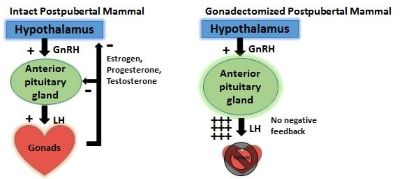Exploring How Spay/Neuter Impacts Long-Term Health in Dogs
Recent research demonstrates an association between the reproductive status of dogs (whether or not they have been spayed or neutered) and numerous long-term health effects. Removing the gonads (ovaries or testes) also removes the hormones they secrete. While the primary function of these gonadal hormones is reproduction, they are also important to hormonal, musculoskeletal, and behavioral health. They may also play a role in protecting dogs from cancer.
The AKC Canine Health Foundation (CHF) funded several studies that examined the medical records of dogs at the University of California, Davis Veterinary Medical Teaching Hospital. (See “An Update on the Health Effects of Spay/Neuter in Dogs” for more information on these grants and their outcomes.) Analysis of canine reproductive status and other disease diagnoses showed that the health effects of surgical removal of the ovaries or testes (gonadectomy) vary depending on the age at gonadectomy, whether the dog is male or female, and the breed or size of dog. In effect, there is no one size fits all recommendation regarding if or when to spay or neuter a dog.
Right now, we know there is an association between gonadectomy and adverse health effects, but does gonadectomy cause those adverse effects? If so, how? Studying how spay/neuter and the loss of gonadal hormones may produce these adverse health effects will help veterinarians and dog owners make more informed and personalized decisions regarding if or when to spay/neuter a dog. Understanding the mechanisms of disease production may also provide opportunities to manage or prevent these adverse health effects.

Investigators at Oregon State University are focusing on one potential mechanism of disease development in dogs following gonadectomy – the role of luteinizing hormone (LH) in non-reproductive and cancerous tissues. Dogs that have been spayed or neutered can have blood LH levels up to 30 times normal because hormonal negative feedback is lost (Figure 1). The main role of LH is to stimulate ovulation in the female. However, LH can interact with numerous non-reproductive tissues such as the thyroid gland, adrenal glands, gastrointestinal tract, cranial cruciate ligament and lymphocytes (a type of white blood cell). Several tumor tissues can also be influenced by LH. Could these excessive LH levels play a role in the adverse health effects associated with gonadectomy?
In a recent publication in Animals: An Open Access Journal, CHF-funded researcher Dr. Michelle Kutzler described how LH may interact with various tissues and ultimately, cause adverse health effects.1 Some examples include:
-
LH receptors are found throughout the lower urinary tract in dogs. However, spayed female dogs with urinary incontinence have significantly more LH receptors here compared to intact females, indicating that LH concentrations may affect these tissues. Another fact that supports this conclusion is that urinary incontinence can often be successfully treated with hormones that decrease circulating LH concentrations.
-
Serum thyroid hormone levels are significantly lower in dogs that have been spayed or neutered. There are numerous LH receptors in the thyroid gland, and they sit near thyroid stimulating hormone (TSH) receptors. Continuous stimulation of the thyroid gland LH receptors could interfere with the normal function of neighboring TSH receptors, disrupting thyroid gland function and contributing to hypothyroidism.
-
Gonadectomized dogs have more lymphocytes (T cells specifically) with LH receptors circulating in the blood stream compared to intact dogs. Cells in cancerous lymph nodes can also have LH receptors. Both facts suggest how LH could influence lymphocytes and play a role in the development of lymphoma.
With funding from CHF Grant 02751-A: Luteinizing Hormone Receptor Activation Induces Migration and Adhesion in Neoplastic Canine Lymphocytes, Dr. Kutzler is exploring if increased LH receptor stimulation causes adhesion and migration of cancerous lymphocytes. Chemical signals allow lymphocytes to stick in certain places or move to new locations, essentially travelling to various locations throughout the body. This is good when healthy lymphocytes are called to fight off invaders, but allows rapid spread of lymphoma throughout the body when cancerous lymphocytes are on the move.
Results of this research could identify new strategies to stop the development and spread of lymphoma, a common canine cancer. They will also contribute to the body of evidence that veterinarians and dog owners must discuss when deciding if or when to spay/neuter a dog. Finally, if gonadectomy is needed, results will provide insight into managing the potential adverse health effects of this procedure. CHF and its donors are committed to improving our understanding of these complex and inter-related conditions in dogs. Learn more about CHF’s diverse portfolio of canine health research grants at akcchf.org/research.
References:
1. Kutzler, M. A. (2020). Possible Relationship between Long-Term Adverse Health Effects of Gonad-Removing Surgical Sterilization and Luteinizing Hormone in Dogs. Animals: An Open Access Journal from MDPI, 10(4).
https://doi.org/10.3390/ani10040599
Related Articles
Help Future Generations of Dogs
Participate in canine health research by providing samples or by enrolling in a clinical trial. Samples are needed from healthy dogs and dogs affected by specific diseases.



